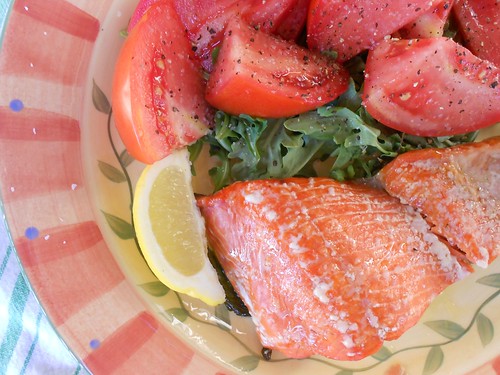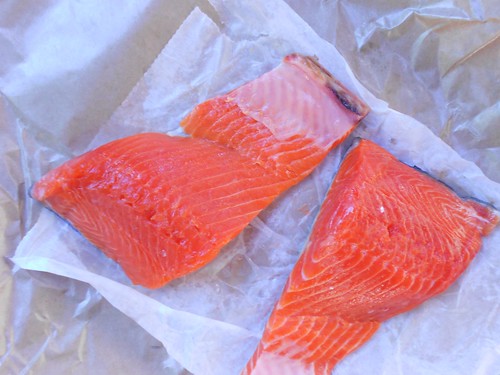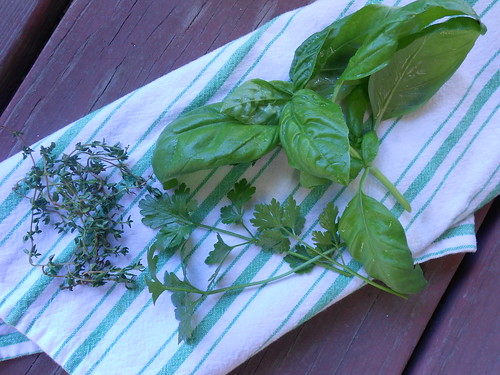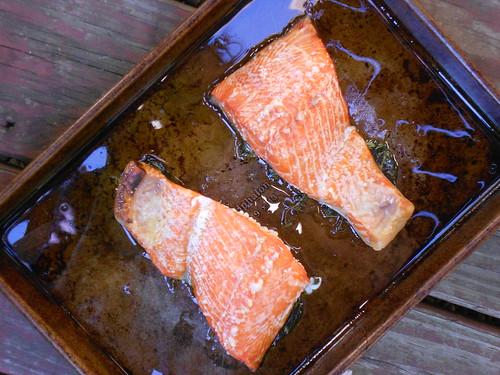
I've been reading Nina Planck's Real Food: What to Eat and Why a little before bed each night for the past couple of weeks. It's making me feel really good about making food decisions that are extremely, ridiculously pleasant. Like whole, pastured, non-homogenized (when I can find it) dairy, which tastes so, so much better than its non- or low-fat counterparts. Or grass-fed beef, which is naturally lean, tastes amazing, and is chock-full of healthy cholesterol. Or pastured eggs, with their bright orange, protein- and omega-3-rich yolks.

Then there's wild salmon, the chapter I'm currently reading. I'm beginning to believe that wild salmon is the answer to all modern health issues. People who eat salmon once a week are at a decreased risk of heart attack, stroke, heart arrhythmia, high blood pressure, and high triglycerides in the blood. Omega-3s help to regulate blood sugar and suppress insulin resistance. It's been well-documented and publicized that DHA, a type of omega-3 fatty acid found in high concentrations in salmon, is vital for fetal and infant development, but why? Our brains are made of about 60% fat, and the most important type of fat is - you guessed it - DHA! DHA consumption has been linked to higher IQ and brain function, and to a decreased risk of neural and spinal birth defects.
Ever heard of pregnancy brain? I'm starting to wonder how much of that little-understood, anecdotal symptom of pregnancy could be solved by a couple more servings of fish each week. Developing babies take the nutrients they need from their mothers, whether or not said mothers are conscious of the nutrients they consume. Since our bodies don't produce DHA, but store a lot of it in our brains, maybe those little fetuses are taking mom's brain in order to make their own! If you're pregnant and feeling strangely forgetful, or you'd like to reduce your risk of cardiovascular health issues and type-2 diabetes, make some salmon for dinner tonight!


Slow Roasted Salmon
adapted from Bon Appetit
Seek out wild salmon when you're shopping. Farmed salmon is higher in mercury, less sustainable, and much lower in omega-3s. It's also fed dye so that it looks like salmon. The flavor and texture of wild salmon are vastly superior.
2 six-ounce center-cut fillets wild salmon
3-4 tablespoons extra virgin olive oil
assorted fresh herbs, about a cup total (I used thyme, basil, and parsley - dill or rosemary would be great!)
salt
Preheat oven to 325 degrees. Coat the bottom of a baking sheet with a couple tablespoons of the oil, and arrange the herbs in two piles, about the size of the salmon fillets. Lay the salmon skin-side down over the herbs, drizzle with another tablespoon oil, and season lightly with kosher salt. Bake about 25 minutes, until the salmon is just tender - a knife will slide easily into the flesh. Serve warm or at room temperature.
Serving suggestions: A bed of arugula and a chopped up tomato with a squeeze of lemon and a sprinkle of salt and pepper was perfect alongside this salmon when it came out of the oven. It would also be great with sauteed new potatoes and asparagus. I have a piece leftover in my fridge, and I plan to make a sandwich out of it on ciabatta, with lemon-dill-caper mayo and more arugula. Delicious!

I love that book! And the salmon looks fantastic!
ReplyDeleteSeems reading that book is worth it. Your recipe looks delicious.
ReplyDelete